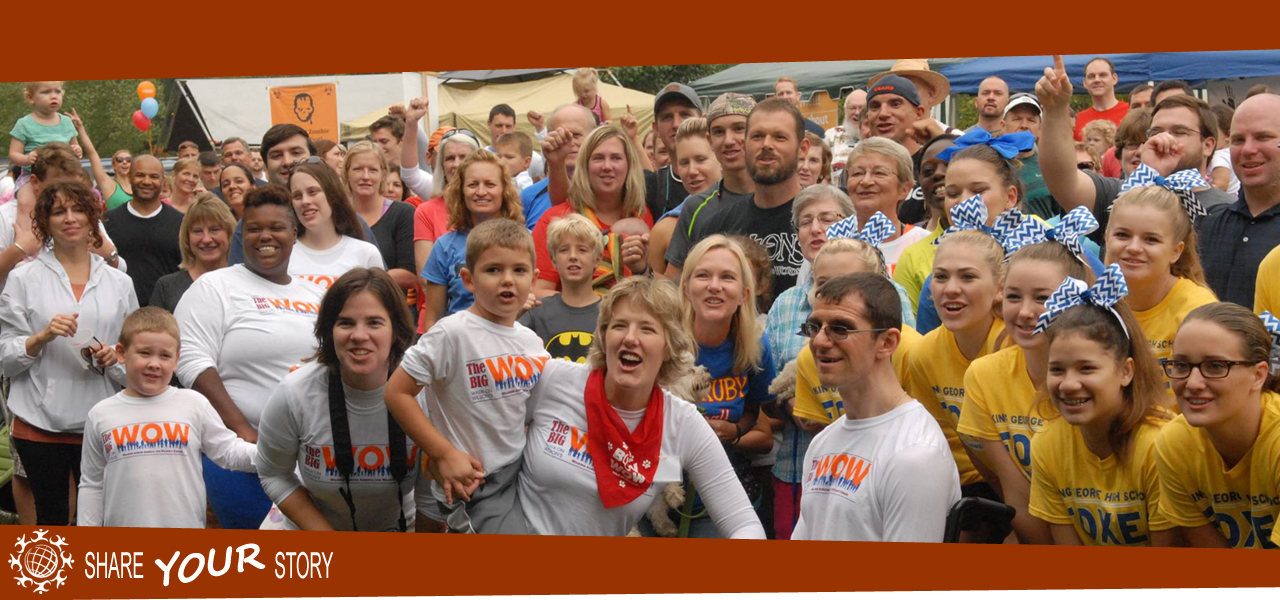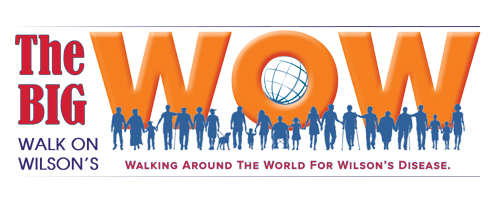

Change. A word that means so many different things to different people. Change is hard to accept. Change is something most people resist. Change is sometimes out of your control. Change is what I needed to do if I wanted to survive and thrive with Wilson's Disease.
I choose to look at change as something positive. I am a stronger, wiser and more compassionate person because of it. I took control back from Wilson's Disease, something I had no control over, and challenged myself to overcome my physical limitations through sheer determination and stubbornness. I would not let it control me. I would not accept that I would have to "live" with my physical limitations. I believed I could get better. I had faith. Faith that I would be able to fight through it and make the most out of the challenges I faced. Faith in myself. And, most importantly, faith that my God would not forsake me.
I will never give up trying to get better. I will never give up hope that I will beat this disease down to something that does not limit me anymore. This is why I choose to share my personal story and why I am so honored and humbled to be a part of the Big WOW in Los Angeles.
I had no idea that my life would completely change in mid-2014. Over the course of the next year, the physical person I was no longer existed. My confidence, assertiveness and strength also began to fade as my physical limitations progressed. From the moment I noticed a slight change in my otherwise very neat and small handwriting, I knew something was wrong. It did not make sense to me. I also noticed I was feeling more fatigued than usual. At first, I attributed it to my consistently long working hours as a trial attorney. But it was a different kind of fatigue; something no amount of sleep and rest would alleviate. I decided to go to the doctor. Initially, my doctors dismissed my symptoms because they were so slight and because things change with age.
But I know me. I know my capabilities. Over the next few months, I noticed slight tremors in my hands and neck, I was slower at tasks I used to do quickly, my balance was getting worse, I could not focus my eyes, and the fatigue and changes in handwriting got significantly worse. None of my doctors could figure out why my neurological faculties were deteriorating so quickly. Without running more tests or researching my symptoms, they casually and quickly dismissed me. So, I insisted I be referred to a neurologist. I made an appointment with Dr. Saumya Gill and to my relief, she believed me that something was wrong. She told me, "high functioning, intelligent people would notice the slightest change sooner." That statement comforted me because it validated to me that my symptoms were real. Dr. Gill ran multiple blood tests, ordered MRIs and referred me to various specialists. Unfortunately, the specialists did not believe me and told me I had a psychological problem. Those doctors took the easy way out and blamed the problem on the patient. I believe if more doctors were like Dr. Gill, other patients would be diagnosed sooner with Wilson's Disease. She took the time to listen, to care about her patient and believe her patient. It is that belief that allows a patient who is struggling with an unknown illness to continue fighting for the answer.
I continued to deteriorate. So much so, I was staggering around. It was hard to keep my balance. My tremors were worse. Then, my voice and speaking ability changed. It became arduous for me to even communicate the symptoms I was experiencing and what I was feeling. In public, the moment anyone heard my voice, my slow rate of speech, and inability to articulate and say multisyllabic words, they turned to look at the "weird" person. It shocked my conscious that people looked at me like I was less than a whole person. They made assumptions about my intelligence and capabilities. My mind was still working. My internal voice was screaming, "I am still me! I can still think! I am not stupid!" The looks I received were disheartening. This was a novel and frightening experience for me because I was so accustomed to commanding attention when I spoke in a courtroom or at meetings and events.
My health reached a tipping point one evening, which sent me to the emergency room. The ER doctors were confounded and diagnosed me with generalized ataxia. I was admitted to the hospital for further testing. The next morning, the head of the neurology department examined me using subjective tests based on his preconceived bias that many neurological symptoms are caused by mental health issues. Without reviewing my medical record and conducting a thorough neurological exam, he diagnosed me with Panic Disorder. It was at that point I realized I had to get proactive and advocate for myself. I had never suffered a panic attack before in my life. I had a high stress career. In fact, I thrived under stressful situations. My experience with this neurologist was the spark that reignited my confidence and allowed me to stand up for myself. I refused to believe the doctors that dismissed me.
After he discharged me with a mental health disorder, I went back to Dr. Gill and she referred me to a movement disorder specialist (within the HMO I was currently insured) and to an outside movement disorder specialist, Dr. Jeff Bronstein, at UCLA. Dr. Gill and the neuroradiologist suspected Wilson's Disease. After meeting with Dr. Bronstein, he confirmed my diagnosis of Wilson's Disease in August 2015.
Dr. Gill put me on a conservative treatment of zinc acetate because my neurological symptoms were so severe. She did not want to risk my neurological symptoms getting worse or becoming permanent on penicillamine or trientine. By this point, I had deteriorated so significantly I was in a wheelchair, bedridden, and unable to control my tremors, feed myself, dress myself, bathe myself and take care of my basic needs. I could barely speak. Other than my immediate family, no one could understand me. My family could see my suffering. They knew me best and knew the person I was -- self-assured, highly motivated, independent and hardworking. At my lowest point, I felt helpless and despondent. I wondered if I would need 24-hour care for the rest of my life. It was hard for me to be completely and utterly dependent on others. I was worried that I would never be able to return to my career that I loved. Would I be able to live the life I was meant to live? Or would I be this helpless person who could not survive alone?
Although my neurological symptoms were debilitating, I found hope. With a proper diagnosis, I had peace of mind that I finally knew what was wrong with me. I found comfort in knowing my illness was treatable. I renewed my commitment to fight this disease. The first step was taking charge and entering a drug study recommended by Dr. Bronstein in December 2015. He is the Director of Movement Disorders and Wilson's Disease Center of Excellence at UCLA. The study was being conducted by Wilson Therapeutics for a new drug, bis-choline tetrathiomolybdate (WTX101), and directed by Dr. Bronstein at UCLA. Initially, my symptoms worsened but over time I noticed changes. I was feeling stronger and less tired. After three months on the drug, I decided I was strong enough to start physical, occupational and speech therapies. It was not easy. I was still in a wheelchair. I still could not do most things for myself. And the 30-minute sessions took everything out of me.
Over the next few months, I noticed that I was getting better. I practiced my therapy "homework" for at least four hours per day. Then one day, I decided I would take a walk around the block. The first time I tried I stopped multiple times, rested my head against walls because of my neck tremors and supported myself on my sister who shares this disease with me (subsequently diagnosed in late 2015). Before I knew it, I could walk around the block without stopping. By November 2016, I was walking 10,000 steps per day! Although I struggled, I could do day-to-day tasks and take care of myself. I started driving again in late December 2016.
Now, I am completely independent. Strangers would never know I had a debilitating neurological disorder. I am very active again like I used to be. I regularly go to Pilates and spin classes, walk/run most days and I am back to weightlifting.
I could not have accomplished this without the support of my loving husband (who married me when I was sick and before my diagnosis), my family, my church family, my friends, Dr. Gill, Dr. Bronstein and the incredibly extraordinary medical team at UCLA. God gave me the strength and will to keep fighting, and have faith that all things are possible with Him. I am humbled by His grace and mercy on me.
I share my story because together we can beat this by inspiring others, encouraging others, supporting others and having collective faith that we will become the best person we can be with Wilson's Disease. The reason why I choose not to show my face in my profile picture is because I want to represent all the faceless people suffering with this disease. We are all one and the same. Nine months ago, I would never have believed I could climb up the stairs at the Baldwin Hills Scenic Overview (almost 300 steps going 950 feet vertically). But I can now. This is me triumphing over Wilson's Disease and reaching the top of the mountain!






